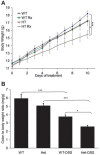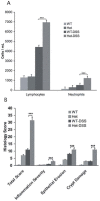Increased susceptibility to dextran sulfate sodium induced colitis in the T cell protein tyrosine phosphatase heterozygous mouse - PubMed (original) (raw)
Increased susceptibility to dextran sulfate sodium induced colitis in the T cell protein tyrosine phosphatase heterozygous mouse
Syed-Wajahat Hassan et al. PLoS One. 2010.
Abstract
T cell protein tyrosine phosphatase (TC-PTP/PTPN2) is an enzyme that is essential for the proper functioning of the immune system and that participates in the control of cell proliferation, and inflammation. We previously observed that TC-PTP(-/-) mice display various immunodeficiencies, hypersensitivity to LPS and die within three weeks of birth due to anemia and widespread inflammation. A recent analysis of the Wellcome Trust Case Control Consortium (WTCC) genome wide scan data, reported in 2007, indicated a potential role for TC-PTP in inflammatory bowel disease (IBD). To further investigate the potential role of TC-PTP in IBD, we studied heterozygous TC-PTP mutant mice challenged with dextran sulfate sodium (DSS) in their drinking water. In comparison to control animals, we observed significant changes in the colon mucosa of DSS-treated TC-PTP(+/-) mice, in the ratio of colon to body weight, as well as an up-regulation of mRNA transcripts for IL-6, IL-23, 1L-12beta, IFN-gamma, TNF-alpha. Moreover, up-regulation of serum IL-6 levels in DSS-treated TC-PTP(+/-) mice confirms that mice with a single copy of the TC-PTP gene display increased susceptibility to systemic inflammation due to bowel epithelial erosion resulting from DSS challenge. Our findings support the lack of modulation of Janus kinases 1 and 3 (Jak1, Jak3), and the downstream signal transducer and activator of transcription 1,3 and 5 (Stat1, Stat3, Stat 5) by PTPN2 in the development of IBD like condition. Pathological and molecular analysis reveal that the deficiency of TC-PTP results in pro-inflammatory condition in the bowel of heterozygous TC-PTP(+/-) mice. These novel findings in TC-PTP hemi-deficiency support the hypothesis that TC-PTP is an important regulator of inflammatory cytokine signaling and that it may be implicated in the pathophysiology of IBD.
Conflict of interest statement
Competing Interests: The authors have declared that no competing interests exist.
Figures
Figure 1. Increased response to DSS treatment in the presence of only one allele of TC-PTP.
A. Increased weight loss of TC-PTP +/− mice during DSS-induced colitis. At 19 days of age mouse body weight was 11–12 g followed by DSS treatment. Body weight of DSS-treated TC-PTP +/− (Het-DSS) (2.58±0.4) mice were significantly lower than, TC-PTP+/− (Het) (5.0±0.8) and TC-PTP+/+ (WT-DSS) (3.78±0.5) mice ***p<0.0002. DSS-treated TC-PTP+/− mice compared to DSS-treated TC-PTP+/+ mice *p<0.001. Data represent the mean of three groups of three animals each (N = 9). B. Ratio of colon weight of DSS-treated TC-PTP +/− (Het-DSS) mice were significantly lower than DSS-treated TC-PTP+/+ (WT-DSS) mice p<0.05. In the case of TC-PTP+/− (Het) vs. DSS-treated TC-PTP+/− (WT-DSS) mice p<0.001, and p<0.001 in comparison of TC-PTP+/+ vs. DSS-treated TC-PTP+/+ mice.
Figure 2. Loss of colorectal crypt-villi.
A. Histopathological features of the mouse colon in association with colitis. Bar = 1000 µm. From top to bottom: TC-PTP+/+(WT), TC-PTP+/− (Het), DSS-treated TC-PTP+/+(WT-DSS) and DSS-treated TC-PTP+/− (Het-DSS). In TC-PTP+/+(WT) crypts are straight and the base of the glands reach the muscularis mucosae. Crypt-villus axes are normal and epithelium layer is intact. In DSS-treated TC-PTP+/− (Het-DSS) mice ingestion of DSS caused crypt destruction, Numerous neutrophils were present in the section (arrows). Loss of the surface epithelial layer is obvious, while changes in crypt-villus axis and colon tissue architecture are observed. B. The number of crypts per field, field is 1000 µm in colorectal section of bowel. The number of crypts in DSS-treated TC-PTP+/− (Het-DSS) mice were significantly lower than DSS-treated TC-PTP+/+ (WT-DSS) mice p<0.002. C. Crypts in field, crypts width, crypts height and epithelial height were quantified. Data represent mean and SD of three groups of three animal each (N = 9).
Figure 3. Blood cell counts and histological analysis of colons.
A. Increase in numbers of lymphocytes p<0.0114 and neutrophils p<0.0001 in DSS-treated TC-PTP +/− mice compared to DSS-treated TC-PTP+/+. B. The mean histology activity scores of colon tissue sections of TC-PTP+/+(WT) (0.3±0.34), TC-PTP+/− (Het) (7±0.55), DSS-treated TC-PTP+/+(WT-DSS) (12±0.48) and DSS-treated TC-PTP+/−(Het-DSS) (32±0.67) mice. Analysis was performed blinded by pathologist on a scale from 0 to 40 (see Methods).
Figure 4. Jak/Stat signaling pathways.
Immunoblotting was used to observe total protein levels and protein phosphorylation levels of JAK1, JAK3, STAT1, STAT3 and STAT5.
Figure 5. Colonic up-regulation of cytokines mRNA expression.
DSS-treated TC-PTP+/−(Het-DSS) mice showed up-regulation of TNFα, IFNγ, IL-12 β, IL-23R and IL-6. Untreated TC-PTP−/− (null) mouse colon mRNA was used as a control.
Figure 6. IL-6 serum level in DSS-treated and control mice.
Serum was collected at the time of euthanasia and analyzed for cytokine levels using Mouse Cytokine Multiplex Assay. A 4.2-fold increase in serum IL-6 concentration in the TC-PTP+/−(Het-DSS) (11.6±7.6 pg/ml) compared to TC-PTP+/+ (WT-DSS) (2.6±2.4 pg/ml) mice (p<0.05).
Similar articles
- Loss of T-cell protein tyrosine phosphatase in the intestinal epithelium promotes local inflammation by increasing colonic stem cell proliferation.
Bussières-Marmen S, Vinette V, Gungabeesoon J, Aubry I, Pérez-Quintero LA, Tremblay ML. Bussières-Marmen S, et al. Cell Mol Immunol. 2018 Apr;15(4):367-376. doi: 10.1038/cmi.2016.72. Epub 2017 Mar 13. Cell Mol Immunol. 2018. PMID: 28287113 Free PMC article. - Deficiency of Protein Tyrosine Phosphatase Non-Receptor Type 2 in Intestinal Epithelial Cells Has No Appreciable Impact on Dextran Sulphate Sodium Colitis Severity But Promotes Wound Healing.
Kasper SH, Spalinger MR, Leonardi I, Gerstgrasser A, Raselli T, Gottier C, Atrott K, Frey-Wagner I, Fischbeck-Terhalle A, Rogler G, Scharl M. Kasper SH, et al. Digestion. 2016;93(4):249-59. doi: 10.1159/000445289. Epub 2016 Apr 27. Digestion. 2016. PMID: 27115526 - Activation of protein tyrosine phosphatase non-receptor type 2 by spermidine exerts anti-inflammatory effects in human THP-1 monocytes and in a mouse model of acute colitis.
Morón B, Spalinger M, Kasper S, Atrott K, Frey-Wagner I, Fried M, McCole DF, Rogler G, Scharl M. Morón B, et al. PLoS One. 2013 Sep 9;8(9):e73703. doi: 10.1371/journal.pone.0073703. eCollection 2013. PLoS One. 2013. PMID: 24040033 Free PMC article. - The role of T-cell protein tyrosine phosphatase in epithelial carcinogenesis.
Morales LD, Archbold AK, Olivarez S, Slaga TJ, DiGiovanni J, Kim DJ. Morales LD, et al. Mol Carcinog. 2019 Sep;58(9):1640-1647. doi: 10.1002/mc.23078. Epub 2019 Jul 1. Mol Carcinog. 2019. PMID: 31264291 Free PMC article. Review. - PTPN2 in the Immunity and Tumor Immunotherapy: A Concise Review.
Song J, Lan J, Tang J, Luo N. Song J, et al. Int J Mol Sci. 2022 Sep 2;23(17):10025. doi: 10.3390/ijms231710025. Int J Mol Sci. 2022. PMID: 36077422 Free PMC article. Review.
Cited by
- Loss of guanylyl cyclase C (GCC) signaling leads to dysfunctional intestinal barrier.
Han X, Mann E, Gilbert S, Guan Y, Steinbrecher KA, Montrose MH, Cohen MB. Han X, et al. PLoS One. 2011 Jan 31;6(1):e16139. doi: 10.1371/journal.pone.0016139. PLoS One. 2011. PMID: 21305056 Free PMC article. - Protein phosphatases in systemic autoimmunity.
Pan W, Tsokos MG, Li W, Tsokos GC. Pan W, et al. Immunometabolism (Cobham). 2025 Feb 10;7(1):e00056. doi: 10.1097/IN9.0000000000000056. eCollection 2025 Jan. Immunometabolism (Cobham). 2025. PMID: 39944077 Free PMC article. Review. - Genetics of serum concentration of IL-6 and TNFα in systemic lupus erythematosus and rheumatoid arthritis: a candidate gene analysis.
Solus JF, Chung CP, Oeser A, Li C, Rho YH, Bradley KM, Kawai VK, Smith JR, Stein CM. Solus JF, et al. Clin Rheumatol. 2015 Aug;34(8):1375-82. doi: 10.1007/s10067-015-2881-6. Epub 2015 Feb 5. Clin Rheumatol. 2015. PMID: 25652333 Free PMC article. - LINGO3 regulates mucosal tissue regeneration and promotes TFF2 dependent recovery from colitis.
Zullo KM, Douglas B, Maloney NM, Ji Y, Wei Y, Herbine K, Cohen R, Pastore C, Cramer Z, Wang X, Wei W, Somsouk M, Hung LY, Lengner C, Kohanski MH, Cohen NA, Herbert DR. Zullo KM, et al. Scand J Gastroenterol. 2021 Jul;56(7):791-805. doi: 10.1080/00365521.2021.1917650. Epub 2021 May 3. Scand J Gastroenterol. 2021. PMID: 33941035 Free PMC article. - Intestinal epithelium and autophagy: partners in gut homeostasis.
Randall-Demllo S, Chieppa M, Eri R. Randall-Demllo S, et al. Front Immunol. 2013 Sep 30;4:301. doi: 10.3389/fimmu.2013.00301. Front Immunol. 2013. PMID: 24137160 Free PMC article. Review.
References
- Franke A. Replication of signals from recent studies of Crohn's disease identifies previously unknown disease loci for ulcerative colitis. Nat Genet 2008 - PubMed
- Glinsky G. An SNP-guided microRNA map of fifteen common human disorders identifies a consensus disease phenocode aiming at principal components of the nuclear import pathway. Cell Cycle. 2008;7:2570–2583. - PubMed
- Wu F. MicroRNAs are differentially expressed in ulcerative colitis and alter expression of macrophage inflammatory peptide-2 alpha. Gastroenterology. 2008;135:1624–1635. - PubMed
Publication types
MeSH terms
Substances
LinkOut - more resources
Full Text Sources
Other Literature Sources
Molecular Biology Databases
Research Materials
Miscellaneous





